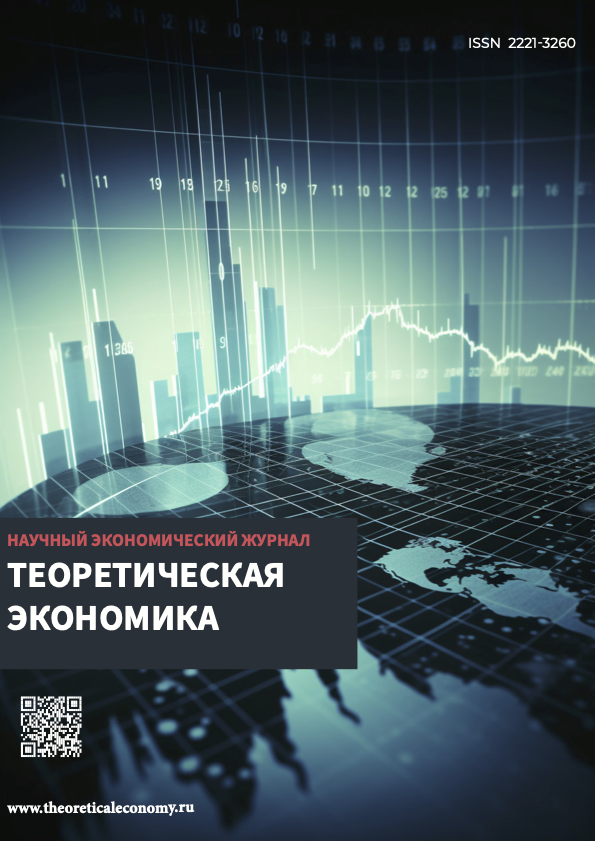employee from 01.01.1998 until now
Lomonosov Moscow State University
employee from 01.01.1998 to 01.01.2023
Moskva, Moscow, Russian Federation
Importance The description of modern interstate exploitation, secretly and thinly realized by Anglo-Saxon world by means of the value segregation of fundamental vital properties in the frame of its globalist project. Objectives To consider opportunities of Russia to overcome the indicated global interstate nomos-segregation exploitation. Methods It is used the created by the author the history-system conception oft a State and its social development. Results It gives means to give a modern answer to the classical Adam Smith’s question about the creation of vital properties of nations in States. It is shown that vital properties in States are created by means of extraction (for man), production (for man), and imputing (into man). It leads to selecting in States the three fundamental vital nomoses: extractionomy, industrynomy, and anthroponomy. These nomoses existed and exist simultaneously and indissolubly in every State, but in different proportion. The change of this proportion is possible in frames of center-periphery systems only. It is described as Anglo-Saxon world is created its global center-periphery system with controlled by him the extracting and material-industry periphery and is realized the internal transition to ideal-industrynomy and to hyper anthroponomy in frames of its globalist project. The globalist project turned out to be extremely successful for Anglo-Saxon world namely, allowing him to realize the interstate exploitation of all peripheries by means of the secret value segregation of fundamental vital properties on the global market. Conclusions and Relevance Russia for the time of «perestroika» is plunged onto the lowest (extracting) floor of the corresponding global segregation-exploitation pyramid. The strategically and epochal best way to Russia deliverance from this exploitation is the recreation of sovereign full value three nomos vital creativity. This recreation should be leaned on external trade mutual relations only in frames of own macro regional cooperants such as BRICS plus Iran, Turkish, and others. Russia possesses sufficient possibilities for full rights participation in creation of such proper cooperants.
vital properties, vital nomoses, historical three nomos vital creativity, center-periphery systems, globalist project, value segregation, interstate exploitation, recreation of sovereign three nomos vital creativity in Russia, macro regional cooperants, Russian energy «lever» and its support points.
1. Anilionis G.P., Zotova N.A. Global'nyy mir: edinyy i razdelennyy. Evolyuciya teoriy globalizacii. M.: Mezhdunarodnye otnosheniya, 2005. 676 s.
2. Badalyan L.G., Krivorotov V.F. Istoriya. Krizisy. Perspektivy: Novyy vzglyad na proshloe i buduschee. M.: Knizhnyy dom «LIBROKOM», 2012. 288 s.
3. Bell D. Gryaduschee postindustrial'noe obschestvo. Opyt social'nogo prognozirovaniya. M.: Academia, 2004. 944 s.
4. Voloshin A.V., Aleksandrov Yu.L. Evolyuciya teoriy konkurencii i konkurentosposobnosti v ekonomicheskoy nauke // Fundamental'nye issledovaniya. 2017. № 4-2. S. 330-338.
5. Dobren'kov V.I. Globalizaciya. Suschnost', proyavleniya i social'nye posledstviya. M.: Akademicheskiy proekt, 2018. 636 s.
6. Dobren'kov V.I. Global'naya politika i novyy mirovoy poryadok. M.: Akademicheskiy proekt, 2019. 542 s.
7. Zaharov V.K. Suverenizaciya rossiyskoy ekonomiki // Ekonomicheskiy analiz: teoriya i praktika. 2021. T. 20. Vyp. 9. S. 1623-1652.
8. Zaharov V.K. Nomologiya. Mir i Rossiya. Kto vinovat? i Chto delat'? Moskva: Izdatel'stvo «Rodina», 2022. 668 s.
9. Zaharov V.K. Ob'edinitel'naya ideya i ob'edinitel'nyy proekt dlya suverennoy Rossii // Nacional'nye interesy: prioritety i bezopasnost'. 2022. T. 18. № 5. S. 928-960.
10. Zaharov V.K. Ukreplenie strategicheskoy zaschischennosti Rossii v usloviyah vneshnego geopoliticheskogo vyzova posredstvom obustroystva rossiyskogo prostranstva // Ekonomicheskiy analiz: teoriya i praktika. 2022. T. 21. № 2. S. 266-288.
11. Kastel's M. Informacionnaya epoha: Ekonomika, obschestvo i kul'tura. M.: GU VShE, 2000. 608 s.
12. Kobyakov A.B., Voskanyan M.V. Social'nyy konservatizm. Vyhod iz konflikta levyh i pravyh idey. M.: «Knizhnyy mir», 2021. 448 s.
13. Men'shikov S.M. Anatomiya rossiyskogo kapitalizma. M.: Mezhdunarodnye otnosheniya, 2004. 432 s.
14. Meyson P. Postkapitalizm: putevoditel' po nashemu buduschemu. M.: Ad Marginem Press, 2016. 416 s.
15. Porter M.E. Mezhdunarodnaya konkurenciya. Konkurentnye preimuschestva stran. M.: Al'pina, 2016. 947 s.
16. Rouds R. Energiya. Istoriya chelovechestva. M.: Izdatel'stvo «KoLibri», 2021. 496 s.
17. Ryazanov V.T. (Ne)Real'nyy kapitalizm. Politekonomiya krizisa i ego posledstviy dlya mirovogo hozyaystva i Rossii. M.: Ekonomika, 2016. 695 s.
18. Toffler E. Shok buduschego. M.: Izdatel'stvo ACT, 2002. 557 s.
19. Uebster F. Teoriya informacionnogo obschestva. M.: Aspekt Press, 2004. 400 s.
20. Fedorenko N.P. Rossiya na rubezhe vekov. M.: Izdatel'stvo «Ekonomika», 2003. 727 s.
21. Yakunin V.I. i dr. Postindustrializm. Opyt kriticheskogo analiza. M.: Nauchnyy ekspert, 2012. 288 s.
 This work is licensed under Creative Commons Attribution-NonCommercial-NoDerivatives 4.0 International
This work is licensed under Creative Commons Attribution-NonCommercial-NoDerivatives 4.0 International












